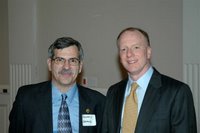Interesting there are a number of people here who I have seen recently... in fact three times in the last month. I guess I am really in the business now.

The plenary sessions, when all of us are gathered together have been particularly impressive. Peretz Lavie offered a historical perspective on obstructive sleep apnea - identifying a number of oversights of history. It was wonderful to hear him recount the stories. I had read about many of them in his book Restless Nights. Here is a link to Amazon from our web site - http://www.sleepapnea.org/resources/books.html. This is a great book if you are interested in the history of this "medical mystery." Dr. Lavie will provide me with a copy of the slide set and my hope is to put the timeline of events on the ASAA web site with links to the historical documents... maybe a whole interactive history.
The second plenary presentation... yesterday was by Dr. Charles George on the social and societal outcomes in (from) sleep apnea. A more traditional presentation in the form a review of the literature. It has been well documented, perhaps not well annouced to the whole world, that untreated sleep apnea has a negative effect on the bed partner, increases the number of auto accidents and increases significantly the cost of healthcare. Dr. George was the lead author on the study on sleep apnea in NFL players.
The third plenary session is today. The speaker is Colin Sullivan, the author on the first paper published on the uses of CPAP for the treatment of obstructive sleep apnea. I have had several opportunities during the conference to talk with Dr. Sullivan, who is a rather modest unassuming man given the impact that his thinking has had on so many people around the world. An interview with him is the lead story in a combined spring/summer newsletter we published this year.
Next time a report on the sessions and the posters.
